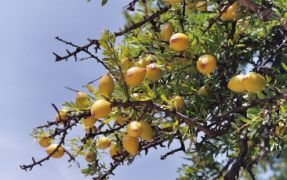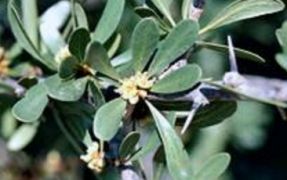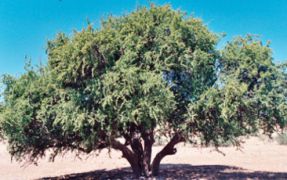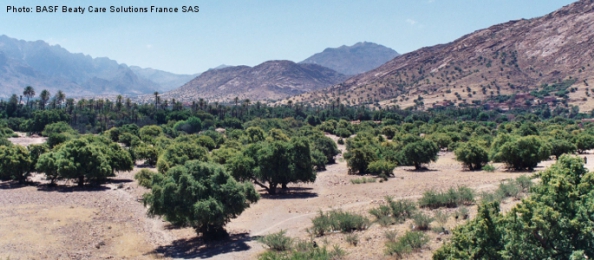The Argan Program in Morocco
With the integration of Cognis and its active ingredients business, Laboratoires Sérobiologiques (LS), BASF has broadened its product portfolio based on renewable raw materials in the last years. One of renewable raw materials is Argan oil from Morocco.
In close partnership with L’Oréal, the former LS organization – which has now become part of BASF Care Chemicals actives business – established a pioneering tripartite approach in 2008 for a greater commitment to sustainability and to foster corporate social responsibility in the Argan supply chain. As part of its Argan oil sourcing, LS(Former LS organization – now part of cashier of the Toudarte cooperative
BASF Care Chemicals actives business) has taken a voluntary approach to sustainability. This approach contributes to the objectives of the Convention on Biological Diversity and ensures a fair return (fair price and capacity enhancement) by enabling cooperatives to gradually achieve economic empowerment through the sustainable use of natural resources.
| Initiator | BASF |
| Project start | 2008 |
| Status | ongoing |
| Region | Morocco |
| Contact person | Charlotte d’Erceville |
| Awards |
Project benefit
- Creating of new employement opportunities
- Protection of valuable nature
- Development of rural communities
| Anti-Corruption | - |
| Business & Peace | X |
| Development | X |
| Environment | X |
| Financial Markets | - |
| Implementing UNGC Principles in your Corporate CSR Management | - |
| Human Rights | - |
| Labour Standards | - |
| Local Networks | - |
| Advocacy of global issues | - |
| Business opportunities in low income communities/countries | X |
| Project funding | - |
| Provision of goods | - |
| Provision of services/personal | - |
| Standards and guidelines development | X |
- Targanine cooperative network
- L’Oréal
- Yamana
Sustainable sourcing of new raw materials
Continuously looking for new plants that can be used in the development of innovative active ingredients for the cosmetic industry, LS began to study the local ecosystem in Morocco in 2001 and the Argan tree in particular. Experts identified new uses for extracts from parts of the Argan tree that had previously not been known or used for such cosmetic applications.
To take into consideration traditional knowledge and local expertise, a partnership was set up between LS and Zoubida Charrouf, a professor at Rabat’s Mohamed V University and the founder of the Targanine cooperative network. The long-term goal was to combine scientific innovation, commercial development of the Argan sector in Morocco, and certain sustainability principles specific to the requirements of the region and the Argan supply chain. Key elements included diversification of local revenues, the protection of the Argan forest, and the support of local cooperative members
“This pioneering CSR partnership between a consumer goods company, a raw material supplier, and an NGO, for a multiple stakeholder commitment, is quite without precedent. It is an ongoing process, where we are already have been seeing satisfying results. Our local partners have continually reached a higher level of autonomy and independence, and as we have all worked together, we have made continued strategic progress while respecting the needs of local communities and the environment.”
Charlotte d’Erceville, R&D Data and Sustainable Development Manager,
BASF Care Chemicals actives business
A further step toward sustainability of the supply chain
The raw materials, Argan oil, and other Argan products (such as pressed oil-cake and Argan leaves) are supplied through the Targanine network of cooperatives, which employs a mainly female workforce, leading to a larger number of women being integrated into Moroccan society. Products are purchased specifically from Targanine cooperatives set up in conjunction with Zoubida Charrouf, with the intention of not only providing employment but also creating shared ownership of the cooperative and shared decision making. This process helps to empower previously unemployed Berber women.
“All organizations involved have a relationship built on trust, sincerity, and transparency – and this has made possible the implementation of a healthy long-term CSR structure. LS* and L’Oréal trusted Yamana’s method and recognized the necessity of a holistic approach that included auditing, monitoring, and supporting suppliers, as well as commercial and quality assurance activities.”
Eric Defrenne, Yamana National Coordinator
However, LS was committed to making the supply chain for its Argan products even more sustainable and equitable, exceeding the requirements of some organic certifications and fair trade labels. To this end, it implemented a comprehensive CSR program in collaboration with L’Oréal and Yamana, an NGO known for the CSR structuring of the textile industry.

To get a fair understanding of all parties’ needs and perceptions, Yamana conducted interviews with various stakeholders at all the different stages of the supply chain in order to form a holistic and detailed picture of the situation. This input has been very important to ensure that the process is legitimate, effective, and consistent with the local context.
An 18-month-long program was initiated in June 2008 to propose relevant and realistic improvement measures in the following areas:
- Fair return to the local community:
going above and beyond the minimum requirement expected to pay with fair prices on fair terms. The program looked at ways to ensure decent living conditions and improvements in quality of life. Non-monetary benefits were also considered, such as participation in training programs or health insurance for cooperative members. Besides promoting a better quality of life, the aim is to contribute to the overall economic and social development of the area. The Targanine cooperatives in Morocco supply Argan oil (and other Argan products, such as pressed oil-cake and Argan leaves) to BASF under fair trade conditions, whereby the company pays a fixed premium price for the product in advance (such as a two-year contract for the supply of oil). Of the total price paid for each kilogram of oil-cake, approximately 50 percent is provided in the form of a social fund for each cooperative; 25 percent is given to the Targanine Economic Interest Group for maintenance costs, machinery, investment, and management; and 25 percent is given to the cooperative (which is used indirectly for incomes). - Non-monetary benefits:
In addition to literacy classes and professional training, educational programs relating to environmental protection have also been introduced by international stakeholders. As a result, network members understand the importance of the Argan tree better and are more involved in its conservation. Increased financial autonomy and decision-making power for female workers has helped to raise the social status of the cooperatives’ women in this rural environment. - Traceability:
By making Argan leaves traceable, for example, it is possible to monitor compliance with good collection practices that are necessary for the long-term preservation of biomass. - Respect for traditional knowledge related to local biodiversity:
The aim was to better understand local perceptions of patent rights relating to indigenous local flora. Even where products had been granted patents because of their novelty and inventiveness, third-party evaluation and assessment of local perceptions can help to better guarantee that traditional knowledge is respected. When applying for patents, LS recognized its local partner, Zoubida Charrouf, as co-inventor of new uses for Argan fractions previously never used in cosmetic applications, thereby making sure that traditional knowledge and geographical origin were documented and respected.
Yamana was given the task of checking what impact patents have on the economic activity and general functioning of the sector as well as examining local people’s perceptions about how the patents influence their monetary and non-monetary returns. These interviews revealed local perceptions to be neutral and positive about the impacts of LS activity on the economic and social development.
“I have worked in the cooperative since its creation in 2004. As treasurer and cashier, I write the checks among other things. Previously, I was at home with no paid work, only the daily family tasks. The money I earn allows me to help my children at school. Schooling is free, but we have to buy pens, school books, etc. We live in a very poor area. My husband has a job too, but that alone is not always sufficient.”
Fatima, treasurer and cashier of the Toudarte cooperative
Protection of the biodiversity
To ensure the conservation of biodiversity, strict guidelines are followed during the harvesting and exploitation of natural Argan resources to help conserve the Argan forest. The supply chain also safeguards that the Argan products are cultivated and harvested in an environmentally sound way. Argan oil and Argan oil-cakes have been certified by Ecocert as being 100 percent from organic farming.
“I used to stay at home; I never had a job before. The cooperative allows me to earn a regular income by myself. It also helps us to buy goods we need, by providing a transportation van that sometimes runs free errands for the women – the range of things we can buy in the douar [village] is very limited. Life at home is different, because we have easier access to water and electricity. My husband is ill and cannot work.”
Zaima, member of the Toudarte cooperative
Local empowerment:
As required for fair trade certification, a development fund monitored by the Economic Interest Group receives a premium equal to 5 percent of the oil payment to finance social or technical investments.
Yamana was involved in initiating a Policies and Procedures manual for the cooperatives that was then translated in Arabic language. The manual sets clear rules for members, similar to a CSR code of conduct. This increases the cooperatives’ autonomy and sense of social responsibility – a vital part of efforts to set up a sustainable organization that complies with broad CSR rules. The Policies and Procedures manual formalizes the cooperatives’ CSR processes. It covers various aspects, including: a democratic governance approach, transparency, and equitability between cooperatives; monitoring of benefit allocation; supply conditions; quality guidelines; and social and non-monetary benefits.

As required for fair trade certification, a development fund monitored by the Economic Interest Group receives a premium equal to 5 percent of the oil payment to finance social or technical investments.
Yamana was involved in initiating a Policies and Procedures manual for the cooperatives that was then translated in Arabic language. The manual sets clear rules for members, similar to a CSR code of conduct. This increases the cooperatives’ autonomy and sense of social responsibility – a vital part of efforts to set up a sustainable organization that complies with broad CSR rules. The Policies and Procedures manual formalizes the cooperatives’ CSR processes. It covers various aspects, including: a democratic governance approach, transparency, and equitability between cooperatives; monitoring of benefit allocation; supply conditions; quality guidelines; and social and non-monetary benefits.
It was the first time L'Oréal Research & Innovation established a tripartite agreement with a supplier and a NGO. We went beyond the technical & trade discussion with our supplier and designed together a long term program, precisely adapted to the argan sector specificities, taking fully into account local expectations. The NGO Yamana’s know-how and dialogue experience with stakeholders was a key factor of success for this project. Considering the progress achieved, we went further than the simple purchase of argan oil to the cooperatives, and we gradually decided to reference 3 additional ingredients developed by BASF from the argan tree : leaves extract in 2009, cake oil extract in 2010 and the shellnut powder in 2011. Currrently, Argan is internationally present in more than 15 brands of the L’Oreal group : GARNIER, L'ORÉAL PARIS, LANCÔME, L'ORÉAL professionnel , Yves Saint Laurent, REDKEN, Helena Rubinstein, KÉRASTASE, KIEHL'S, LASCAD and in every product categories: skincare , haircare and make-up products.
Rachel Barré, L’Oréal Research and Innovation - Sustainability Manager
Also quality, safety, and hygiene guidelines have been implemented in order to improve working conditions in the cooperatives. BASF continues to provide technical assistance on a regular basis. This empowers local workers in the areas of production, planning, and quality assurance. The cooperatives also share best practices and learnings among themselves to ensure continuous improvement.
The cosmetic industry has felt the benefits of globalization for many years now. This has led to an exchange of ideas between different regions and increased access to exotic materials. As a responsible company, BASF finds it important to pay attention to sustainability on a global level, including environmental protection, respect of traditional knowhow, but also a fair sharing of profits. The only way to protect biodiversity – and our shared heritage – is by working closely alongside local communities.
The Argan Forest

The Argan tree (Argania spinosa (L.) Skeels) is indigenous to southern Morocco. It is largely found in the southeast of Essaouira on the Souss plain. The Argan forest extends over approximately 800,000 hectares and contains more than 20 million trees. It acts as a natural barrier against the advance of the neighboring Sahara Desert. The fruit of the tree contains a very hard shell, holding between one and three kernels, from which a valuable oil can be extracted. The Argan forest is extremely important in socioeconomic terms, as it supports more than 3 million people (out of a total Moroccan population of more than 30 million). Unfortunately, it is in decline as a result of changes to rural lifestyles. Overexploitation, soil erosion, and desertification have all played a part – as a result, UNESCO classified the Argan forest as a biosphere reserve in 1998. This designation is given to selected inland and coastal ecosystems where modern development can be reconciled with the conservation of biodiversity in practical ways.
Raquel Ark is working for BASF
Charlotte d’Erceville is working for BASF
Viola Moeller has been working for BASF as Senior Manager Sustainability Coordination.
Anne-Laurie Rodrigues is working as a global communications manager for BASF France.
About BASF
BASF is the
world’s leading chemical
company. With about 111,000
employees, six Verbund sites and
close to 370 production sites
worldwide we serve customers and
partners in almost all countries
of the world.
Products
The BASF portfolio ranges from chemicals, plastics, performance products and crop protection products to oil and gas.
Write a comment about this page
Your comments are provided by your own free will and you take sole responsibility for any direct or indirect liability. In order to maintain the highest discussion quality, all comments will be reviewed by our editors. You hereby provide us with an irrevocable, unlimited, and global license for no consideration to use, reuse, delete or publish comments in accordance with our Community Guidelines.
About Us // Privacy Policy // Copyright Information // Legal Disclaimer // Contact
Copyright © 2012-2018 macondo publishing GmbH. All rights reserved.
The CSR Academy is an independent learning platform of the macondo publishing group.









